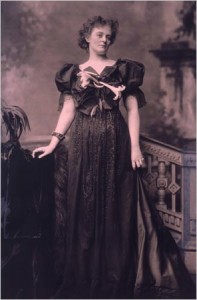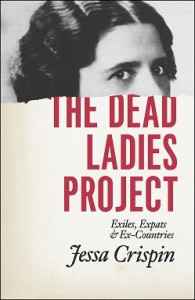Is there a genre of novel that could rightfully be called the female picaresque? Why not?
And:
Must women’s travel writing always end with some peaceful self-discovery and self-acceptance brought about through (a) a promising new love affair, (b) reconciliation with former domestic circumstances/lover/marriage/children/home, or (c) both? Nothing against Eat, Pray, Love, but can a woman ever simply have adventures? Have a relationship with her backpack, fall in love with a landscape or a city? Can her discovery and acceptance and source of deep joy spring from her involvement with her work?
If so, then Jessa Crispin’s Dead Ladies Project fits in that tradition. If not, then Crispin‘s book on “Exiles, Expats, & Ex-Countries” is doing something refreshingly and radiantly new. Crispin, a literary aficionado dedicated enough to found her own magazines, Bookslut and Spolia, sets out on her travels for all the unusual reasons: she’s feeling “pretty unwashed and terrified” (1), as she says in the Prelude. She has to hide the boxed macaroni and cheese cooking on her stove from the cops who have come to pay her a visit, or they’ll see her as a suicide risk for sure: “I mean, I made dinner–would I bother to make dinner if I were intent on ending it all? But I knew if they say what I had made for dinner, they would cotton on to the fact that I had indeed given up on life” (2). Realizing that “[i]t was my circumstances where were killing me” (2), Crispin decides to give up her apartment, pack a suitcase, and take off on a quest for self-discovery with a twist:
It was the dead I wanted to talk to. The writers and the artists and composers who kept me company in the late hours of the night: I needed to know how they did it. I’d always been attracted to the unloosed, the wandering souls who were willing to scrape their lives clean and start again elsewhere. I needed to know how they did it, how they survived it. . . . if I was going to approach these great men and women, I would need to do it on their own territory. I would have to go to them . . . (3)
How’s that for a hook? I won’t tell you the rest other than to hint that Crispin finds her writers, she finds their cities, she finds cities of her own, and as she confronts her own loneliness and painful choices, she thinks in deep and fruitful and eloquent ways about violence, war, history, culture, literature, art, and how the latter help us find ways to come to terms with or at the very least survive the former of that list.

She tracks the religious experiences of William James in Berlin. She sits with Nora Barnacle outside a train station in Treiste, waiting all night for James Joyce to come get her. She trails Rebecca West through Sarajevo, Margaret Anderson to the south of France, the magnificent Maud Gonne to Galway. She mingles with Igor Stravinsky in Lausanne and stalks W. Somerset Maugham through St. Petersburg. London explains for her the cultivated helplessness of Jean Rhys; Jersey Island explains the revolutionary passions of incredibly interesting artist and activist Claude Cahun. Still, it’s not all roses:
The freeing sensation that comes with burning your old life down to the foundations fades surprisingly quickly. At the first sight of rain, you will miss that old roof, inadequate as it might have been (25).
But the conversations that ensue are probing and insightful. Crispin never tries to hide her loneliness. She looks at it thoughtfully, tries to find its shape and heft. She doesn’t sanitize her sources or censor her thoughts, and the book is better for it. She gives us an education, an earnest examination, an eloquent evocation, and an often hilarious confrontation with what it means to be a woman, an artist, a rebel, and a wanderer on this earth. If there’s not already a genre of women writing like this, then let The Dead Ladies Project and Jessa Crispin begin it.
